Talks on ‘Ayodhya Kand’ – Part 1 – February 2019
Talks on “Ayodhya Kand – Based on Valmiki Ramayana” – Part 1 – by Swami Abhedananda
(Gyan Yagna conducted from 2nd February till 6th February, 2019)
Key Points from the Discourses
Day 1
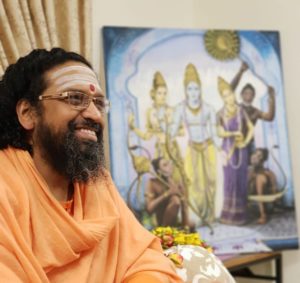 Commencing the Monthly Yagna on Valmiki Ramayana, Swami Abhedanandaji began the discourse with a beautiful chaupai of Tulsidasji – ‘dhanya so kari jab satsanga’ which means, that time is fortunate when one hears satsang. Swamiji impressed upon the fact that in satsang one hears about what truly is the deciding factor of one’s joys and sorrows, and that satsang is not just a pastime that one does when one is free, rather one should hear satsang to become free!
Commencing the Monthly Yagna on Valmiki Ramayana, Swami Abhedanandaji began the discourse with a beautiful chaupai of Tulsidasji – ‘dhanya so kari jab satsanga’ which means, that time is fortunate when one hears satsang. Swamiji impressed upon the fact that in satsang one hears about what truly is the deciding factor of one’s joys and sorrows, and that satsang is not just a pastime that one does when one is free, rather one should hear satsang to become free!
Swamiji then wonderfully elaborated upon the innumerable qualities of Bhagavan Ram as they appear in Valimiki Ramayan. Some of those qualities are summarized below for our online readers:
Beautiful Qualities of Bhagavan Ram
- ‘Ana anusuyakah’ – It is the quality which gives the ability to have such a thought and attitude so that the outer situations don’t take away our discrimination and peace of mind, rather it brings out our inherent beauty and divinity, which pleases the God. This quality was possessed by Bhagavan Ram in great measure.
- When we read Ramayan, we find that there was not even a single occasion when Bhagavan Ram was disturbed because of some issue.
- Every situation can bring out some divinity, purity and devotion in us if we know how to see it correctly.
- Bhagavan Ram never saw faults in others because He didn’t have any ‘bhed budhhi’ (sense of separateness).
- ‘Sa cha nityam prashaantaatmaa’ – Bhagavan Ram was very quiet and joyous at all times because He didn’t have any ego or attachment.
- Ahankaar (Ego) means taking somebody’s words or some situation on oneself, and suffering and enjoying because of that. Bhagavan Ram was never an enjoyer or a sufferer of the good and bad words He heard. Even when Bhagavan Ram had to hear scolding from Parshuramji, He was not disturbed at all.
- Disturbance means a person is not able to do what he is supposed to do. A person with a disturbed mind, can’t talk properly, can’t write properly, can’t drive properly, and surely he cannot do jap or meditation properly.
- ‘Mridu purvam’ – Bhagavan Ram was very soft spoken. He used to always greet first, and didn’t expect or wait for others to greet Him first.
- In giving, one should always be first. If you speak first, you get the punya of quieting the mind of somebody.
- Mridu means soft. Soft indicates that Bhagavan Ram’s heart was soft. You cannot have a hard heart and speak soft for a long time because thoughts alone convert into words.
- ‘Uccha maanopi paarusham’ – Paarusham means that if somebody said hard words, then also Bhagavan Ram never answered in a hard tone.
- Depth of a person is measured by how much hardness he can take and still remain soft.
- Generally, if I am soft with you, you will be soft with me, but if I become hard with you, I bring out the hard personality in you. Therefore, we are devata (good) for somebody and demon (bad) for somebody, depending how they behave with us.
- The real quality is, when you are attacked by harsh words, and still you don’t become hard. If a person has such response it shows he has done a lot of sadhana and meditation, and your mind is revelling in God or in the Self.
- Independently the world cannot give you sorrows and joys. Where your mind is located, accordingly you will experience sorrows and joy. A harsh situation can transform into joyous situation if your mind is situated somewhere near the Lord.
- Our sadhana should be, to take our mind again and again to the inner corner. Sadhana takes our mind from ego to Guru seva and Ishwar bhajan.
- ‘Kadaachit upkarena kritenekena tushyati’ – If somebody did little good, Bhagavan Ram was happy with him for the whole life. It is a very difficult quality because we see what others have not done for us, rather than what they have done for us.
- ‘Na smarati apakaranaam shatamapi’ – If somebody did bad hundred times, then also Bhagavan Ram did not remember the bad but He only remembered the one good that the person did.
- To have this quality one should have a lot of source of joy in himself so that he is not affected by others actions.
- It is your freedom what to remember and what not to remember. Life becomes easier by your memories and it can become difficult by your memories. Somebody hates because of his memory; somebody loves because of his memory. The assertion of what should be remembered, what should be forgotten, should be in your hand.
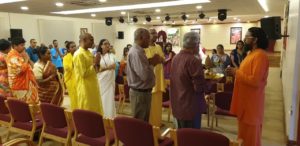 ‘Buddhimaan’ – means not just that Bhagavan Ram was academically very good, but it means that He knew every aspect about everything; and hence He responded to everything and every person in the best possible manner.
‘Buddhimaan’ – means not just that Bhagavan Ram was academically very good, but it means that He knew every aspect about everything; and hence He responded to everything and every person in the best possible manner.
- There are a lot of things we have to know but we don’t know that we don’t know, and we also don’t know that not knowing creates a lot of problems.
- What is the meaning of love? What is the meaning of devotion? What is the meaning of living with people? What is the meaning of living with our own mind? What is the meaning of meditation and sadhana? What is the meaning of controlling the mind? What is the meaning of anger and passion? What is the meaning of teacher and scriptures? All these things we should know very well. Only when we know something, we can control it well.
- All disturbances are nothing but the effect of not knowing something.
- Anything which you interact with, as much as you know about that thing, so much better will be your interaction with it.
- On one aspect, there are a lot of things to think about. It takes just one vritti (thought) to take you to heaven or to hell. One vritti of Kaikayi of attachment with Bharatji took her to so much of problem.
- Life demands more alertness and more knowledge about things. We should live in illumination. We are bad thinkers and therefore we make a lot of mistakes.
- Anybody walking in the dark gets hit, similarly if we have dark thoughts within, we suffer.
- ‘Madhur bhaashi’ – means Bhagavan Ram was very sweet spoken. Sweet speech means choosing such words which makes the sentences beautiful and makes others listen to you. Speech is the best balm to anybody’s wounds.
- Madhur means ‘madhuk ksharati’ – that which sprinkles honey. One should speak something which other person also admires and likes. Boring people are those who only talk about themselves.
- ‘Veeryavaan and Veeren mata na swen vismitah’ – Bhagavan Ram was very brave but at the same time He was not proud that He was so brave.
- Being unaware of your goodness is called humility. Moment you become aware of your goodness, and possess your goodness or success, it is called pride.
- More you possess your goodness, more you dispossess God, and more you dispossess your goodness, more you possess God.
- Talent and ego are very close. So if you become over-aware of your talents, then you create a false image about yourself and you want others also to see you like that. But others see you as per their own nature and wish, and thus a clash happens.
- Beauty of Bhagavan Ram was that He never carried a wrong self image. When He went to Vasishthaji after returning to Ayodhya, He introduces his friends like Sugreev and other monkeys saying, ‘Because of them I killed Ravan.’ Such was His humility!
- Bhagavan Ram was absolutely equanimous in every situation – one day He was sleeping on a golden bed, and the other day on the floor but He never felt that He became small by sleeping on the floor. We put unnecessary worth upon ourselves and try to impose ourselves on others in the world.
- Depersonalizing the personality makes the life very easy. You are free from the person from whom you don’t need anything but you are bound from that person from whom you need something. Bhagavan Ram was not bound by anybody.
Day 2
On the second day of the monthly yagna, Swami Abhedanandaji continued to unearth the hidden treasures of Valmiki Ramayana. We bring to you some snippets from yesterday’s soulful satsang:
Highlighting the Dharma aspect
 Valimiki Ramayana is focused more to emphasize on the Dharma aspect of Bhagavan Ram while Tulsi Ramayana is focused more on the Sharnagati (surrender) aspect.
Valimiki Ramayana is focused more to emphasize on the Dharma aspect of Bhagavan Ram while Tulsi Ramayana is focused more on the Sharnagati (surrender) aspect.
- Dharma means – responding to the outer situations such that our responses take us to realization and not reaction. Thus, after responding, we become quieter and we feel more in control of ourselves. If we do something, after doing which we feel we have lost control, then that is called Adharma.
- Dharma is that through which we get back our own hidden divinity, strength and piousness.
- In the first few chapters of Ayodhya Kand of Valmiki Ramayan, Bhagavan Ram’s dharmic qualities are mentioned in great detail. These qualities have a lot to do with us; they are mentioned so that we can imbibe them and know their value in our life.
Lord Ram – Embodiment of Dharmic Living
- ‘Na cha anrit katha’ – Bhagavan Ram had the quality of truthfulness; He did not utter any lie.
- A person lies either to hide some of his negativity, or he wants to show something that will earn him more respect, or he wants some immediate gain.
- By lying, something very dangerous happens inside. There is a personality born within which says ‘you are a liar’. So somebody constantly accuses us from inside.
- By lying, we create a kind of split personality; a personality that is weak and incapable of doing anything whole-heartedly because we have contradicted ourselves.
- ‘Vridhhanaam prati pujakah’ – Bhagavan Ram was the worshipper of the elderly people.
- It is an unfortunate part of the modern society that the elder people are neglected more; there are more old-age homes than ever before.
- The society in which elders are not respected, is an ungrateful society. And it only indicates that the future generation of such a society will have more difficult times because they have not done sufficient punyas (merits) to get good wishes & blessings from their elders.
- When you serve somebody, the purpose of serving should be to create such an image in the heart of the person that he feels like pouring blessings upon you. His thoughts for you should be – ‘May lot of good come to him. May he never face any kind of problem in his life!’ When such thoughts are created, serving is fulfilled. By serving, you create softness in other person’s heart for yourself.
- But in the modern age, in a rush to make our career, and earn more money, and name & fame, we are forgetting the essence of serving.
- Our arth (wealth) should be for Dharma and not for kaam (selfish desires).The valuables should be for values and not for indulgence.
- We want to live a happy life but we don’t know that happiness comes from blessings which we need to earn by serving.
- We must not think that by serving we do great to somebody else; we do great to ourselves only; we are not obliging anybody.
- We should replace the word ‘helping’ by ‘serving’. Helping is very different than serving. In helping you feel the other person needs your help and thus your helping creates an abhimaan of helping, but in serving you feel that if you had not done, somebody else would have done and it was your opportunity to serve.
- ‘Anuraktah prajabhishcha’ – Bhagavan Ram was highly loved by all the people.
- Love does not come free of cost. One has to be worthy of being loved.
- You can’t force anybody to love you. It is easy to bring out cheap emotions, but to bring out love from somebody can take years.
- ‘Prajaha cha anurajyate’ – Bhagavan Ram loved His praja.
- In loving, many things are needed. One has to forgive, one has to tolerate, one has to serve, one has to talk sweetly, one has to be very selfless and one can’t live his own personal life. Bhagavan Ram had all these qualities in plenty.
- In Ramcharitmanas, Bharatji says that Bhagavan Ram was such that He didn’t even disturb His enemies.
- ‘Jita krodhah’ – Bhagavan Ram was the one who had conquered anger.
- It is a very difficult virtue to have because when we go in the world, a lot of things happen that are not as per our wish. There are more people who do not act as per our wish, and lesser who act as per our wish.
- Jita krodhah means one who has conquered the three most dangerous emotions namely ahankaarh (ego), raag (attachment) and dwesh (hatred).
- Biggest problem with anger is that it loots our capacity of self-control.
- For most of us, anger is pocketed in our heart, it just needs to be provoked. In Bhagavan Ram’s life, there were a lot of situations where He could have been angry, especially when He was banished to the forest, but there was never a trace of anger in Him.
- There is no person in whose life there is no situation to be angry. There are various situations which are provoke-able, but if a person lessens his ahankaar, raag and dwesh then he becomes non-vulnerable. It is as if, someone is throwing a ball but the wicket is not there so it won’t hit anywhere.
- Gita warns us, ‘Know anger to be your enemy’. It is said so because anger can eat your life, it can burn your mind. Anger has disturbed and broken more houses than anything else.
- ‘Deenaanukampi’ – Bhagavan Ram used to have a lot of compassion for those who were down trodden. He wanted to uplift all.
- Anukampa (compassion) should be there in our heart too; we should not neglect anybody.
- Bhagavan Ram was such that if anybody came to Him for charity, He would empty His whole room and give away everything.
- The one who has more money he has responsibility towards the one who has lesser money. Somebody’s wealth appears good only when he shares his wealth. If somebody doesn’t share his wealth, his wealth pricks.
Lord Ram – Embodiment of Dharmic Living
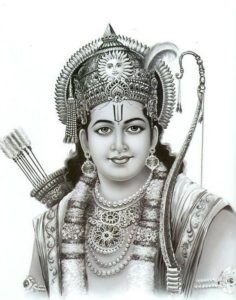 ‘Nityam pragrahavaan’ – Bhagavan Ram always had self-control.
‘Nityam pragrahavaan’ – Bhagavan Ram always had self-control.
- If a person doesn’t have self-control, you don’t know what he will do, what he will speak, where he will fall. Absence of self-control makes a person highly unpredictable.
- No fall is all of a sudden, it starts from a small fall. What is a casual matter in the beginning becomes a serious matter eventually and binds us. One who doesn’t have self-control, he loses his grace and his worth very soon.
- ‘Shuchihi’ – Bhagavan Ram had a lot of purity both inside and outside.
- There is a difference between purity & cleanliness. Cleanliness with divinity is Purity.
- When something is not only clean, but it also has some power giving tendency, it becomes pure. Food is clean is one thing, but when you chant some mantra and offer prayers, all the molecules of the food have more healing power.
- Clean water is one thing and pure water is another thing. When you say ‘this water is devata’ then you bring out the purity aspect.
- One is called physical nourishment, other is mental quietness. When you invoke the purity in the food, it starts giving you mental quietness apart from physical nourishment. Therefore we offer prayers so that the devata of the food can orient itself towards us.
- There was suchi in Bhagavan Ram also in the sense that He didn’t have the thought that anybody is bad. His mind was clean because He was always had pure thoughts.
- Mind, by itself, is not impure, but thinking about something impure, it becomes impure.
- ‘Shatram swadharmam bahu manyate’ – Bhagavan Ram thought that Swadharma (one’s prescribed duties) is very important to practice.
- Everybody is designed for a certain role. If you don’t do what you are supposed to do, then you will lose your value.
- You can’t decide your own duties. Scriptures are there, society is there, father & mother are there to tell us our duties. If you don’t practice that, you will lose your value.
- Everybody’s swadharma requires some sacrifice; you have to give up certain things to perform your swadharma. And if you can’t give up, you will be failing in your swadharma.
- In Gita, Bhagavan says, ‘It is better to die in doing your swadharma than to follow someone else’s dharma.’ Your swadharma alone decides your reputation, your future, your credibility and inner satisfaction, and the joy of the people around you.
- Everything is governed by swadharma. Swadharma involves that you leave your likes & dislikes, and your ahankaar. Bhagavan Ram, if He had attachment for the kingdom or the comforts or attachment for his wife, He wouldn’t have done His swadharma.
- ‘Saadhu’ – Bhagavan Ram was a saadhu, a great saint.
- Saadhu means one who is not having selfishness, who does not live for himself, who doesn’t say that only two or three people are his and rest are not his, he considers everyone as his own.
- Saadhu is the one who can leave any place at will without hanging on to it. In his life, tyag or sacrifice is very prominent.
- Saadhu means one who has a big heart, who has conquered kaam and krodha, who can accommodate everyone.
- Bhagavan Ram was the greatest saadhu. He gave up His kingdom in no time., and never had anger on Kaikeyi.
- We want a sadhu around us – a sadhu wife, a sadhu husband. We don’t want a demanding person around us.
- Saadhu is totally unassuming just like Bhagavan Ram who never asked for anything from anybody. Saadhu is one who doesn’t hold on to anything small.
- A saadhu doesn’t want to express his greatness to anyone. In Sitaji’s swayamvar, when the bow was not breaking, Bhagavan Ram was not impatient to break it.
- In Bhagavan Ram, ssadhutva was pervading everywhere. He just didn’t want anything. He was as happy to live in the forest as in the palace.
- ‘Kalyaan abhijanaah’ – Bhagavan Ram was the abode of all blessings; everyone wanted to bless him.
- He was the patra of all kalyaan, everyone said, ‘Ram, anywhere you go, you should be very happy.’ Even Kaikeyi said the same thing when Bhagavan Ram was leaving for the forest.
- When the demons, Khar & Dushan, saw Bhagavan Ram, even they thought that they shouldn’t fight such a lovely person.
- ‘Dridh bhakti’ – Bhagavan Ram had firm devotion.
- Every morning Bhagavan Ram used to wake up and make Paarthiv Shivlinga (Shivlinga made of mud or sand) and offer prayers religiously.
- Everyone has to deal with a lot of uncertainties and a lot of things that are out of his control. Our worries go away only when we have devotion and we are assured that God will take care.
- Lord is such that He has kept all the important things to Himself. Outer face and limbs etc. can be touched but you have no accessibility to your liver or stomach because Lord has kept important things to Himself. You can have a relationship with someone, but whether that would be joyous or not, is not in your hands. God has kept that area to himself. You can work somewhere, but whether that would give you joy or sorrow is not in your hands. You can take medicines, but whether health will be fine or not is not in your hands. So main things He has kept in His hands. Pandavas and Kauravas fought, but who will win, was in His hands. Then what shall we do? Go to Him! Make Him happy with your behavior. He is observing all our actions and intentions day and night and He will give us the fruits accordingly.
- If you don’t have devotion, God won’t be on your side. Your relations will turn sour and any work you do will not give good fruit. You should invoke His grace, keep a selfless attitude and have purity of thought.
- Don’t just see what your outer achievement is, but observe what is the inner state of the joy of the Lord. There is only one responsibility that we have and that is to please the Lord and rest He will take care.
Day 3
On the third day of the Gyan yagna, Swami Abhedanandaji beautifully put forth the point that Bhagavan Ram took avatar to illustrate and demonstrate the values that every human being must have.
From the elaborately described traits of Bhagavan Ram in Valmiki Ramayana, one should come to realize what kind of nature one must develop.
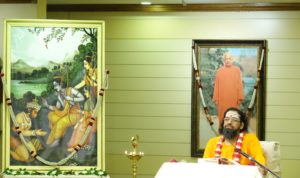 Swamiji explained that a person’s nature is nothing but that which comes out when he is pressed into certain difficulties. If one is surrounded by goodness and is happy then we can’t say that happiness is his real nature, but if one is surrounded by saddening situations and then also he is happy then that is his real nature.
Swamiji explained that a person’s nature is nothing but that which comes out when he is pressed into certain difficulties. If one is surrounded by goodness and is happy then we can’t say that happiness is his real nature, but if one is surrounded by saddening situations and then also he is happy then that is his real nature.
In Bhagavan Ram’s life, we can see that whenever He was pressed beyond a point, He always exhibited his beautiful fragrant nature.
Bhagavan Ram’s Inexplicable Virtues
- ‘Sthir pragnyah’ – Bhagavan Ram was very stable minded.
- We need stability in life. We should hold onto one thing and continue with that. Some people are very unstable minded; their likes and dislikes, their moods change very frequently. Even their spiritual sadhana is very scattered and they don’t focus on one Ishta, one mantra and one Guru.
- We don’t stick to one principle, one ideal. If we want to hold on to anything higher, there will be pain in that, but the moment pain comes, we drop it. One should not have such unstable mind. No sadhana can be done with an unstable mind.
- Bhagavan Ram was Sthir pragnyah. When Nishad Raj invited Him to come in the city, Bhagavan Ram politely refused saying that He has been asked to go in the forest for 14 yrs. Similarly for Sugreev’s & Vibhishan’s coronation, Bhagavan Ram sent Lakshmanji in the city and did not go Himself.
- ‘Na durvaachah’ – Bhagavan Ram never said any bad words for anybody, neither physically nor mentally. When we are angry, we mentally say some bad words if not physically. This way it becomes a habit to create dur-bhaav for other person in our heart. So moment that person’s name comes, it will come along with some abuse. This is not correct. Thus one should be careful to even think bad for anybody.
- ‘Nistandri’ – Bhagavan Ram was free from sloth and laziness.
- A very typical problem with laziness is that a lazy person is an under-performer; he is unable to pursue anything sincerely. He cannot serve because to serve one has to be available and to be available one has to sacrifice his sleep and comfort.
- A lazy person has very less friends because he does not please anybody. He runs away from doing any work; he is neither forth-coming nor prompt. Such a person cannot do any upasana or Guru-bhakti or Ishwar-bhakti.
- Lazy people are forgetful and they have to be reminded many a times what they are supposed to do. They become non-promising people.
- A lazy person cannot be satisfied in life because he has not done sufficiently. All his life, he remains a consumer and not a contributor.
- ‘Shaastragnyah’ – Bhagavan Ram was the knower of scriptures.
- One has to know the scriptures. If you have not known scriptures, you will not know dharma, you will not know adharma, you will not know Atma. Then you will be handicapped in your interactions because you won’t know what is right and what is wrong.
- If you don’t know the scriptures then you will falter at many places. You will only do karma and not karma-yog. You will not know that karma will always take you to disturbance and karma-yoga alone is the life of quietness.
- ‘Kritagnyashcha’ – Bhagavan Ram had the quality of being grateful.
- The mother of Seva is Gratefulness. One won’t have the feeling of giving unless he has the feeling of getting a lot. One who feels that we has got a lot from the God, he alone can serve the God.
- If this quality of being grateful is not there, then a person becomes very dry, non-serving; he keeps on getting but he doesn’t give back.
- A person becomes a Guru bhakt when he has a lot of feeling of getting from the Guru. Strong sense of getting alone makes a person a devotee, makes him surrendered. This sense of getting is not developed in most of the people.
- The virtue of kritagyata makes the personality very fragrant. Bhagavan Ram was kritagya to even Mother Kaikayi.
- ‘Sat sangraha anugrahanena’ – Bhagavan Ram was fond of having saints around him; He used to listen to a lot of satsang.
- ‘Sthaan vinigrahasya cha’ – Bhagavan Ram knew where to use violence. Violence is also required at times when some people have to be eliminated from the system. Bhagavan Ram killed demons like Tadaka, Khar-dushan, Ravan etc. and brought harmony everywhere.
- ‘Na avagyeyashcha bhootanaam’ – Bhagavan Ram’s presence was such that He was non-negligible.
- Some people shine by their presence alone, they need not even speak or do anything.
- If you have character, if you have upasana, if you have strength then you can’t be neglected; you will be counted everywhere. Like if a diamond is lying somewhere it will not be neglected.
- When Hanumanji went to Lanka to Ravana’s palace, everyone started seeing him as a very powerful and strong monkey. Hanumanji’s force was non-negligible.
- ‘Vasudha kshmaya’ – Bhagavan Ram was forgiving like Earth. By seeing someone’s fault as small, you take him out of your mind. By not seeing someone’s fault as small, you bring him much closer to yourself unnecessarily. More you see the fault as small, more you are able to work and live with the person.
- ‘Sheelvaan’ – Bhagavan Ram’s behavior was such that it showered coolness. Nobody ever felt neglected in His company, rather they felt valuable in front of Him.
- You don’t live with people, you see where you are in their heart.
- When other person feels that he has a place in your heart, he will also create a place in his heart for you. But who will initiate? One who has more sheel initiates. Keeping in heart means identifying with other’s joys and sorrows.
- It is written in Ramayan that whenever Bhagvan Ram met anybody, be it a small ordinary person or a known reputed person, He would appropriately enquire about their well-being and their families and would always be ready to identify with their happiness and sadness.
- Bhagavan Rama had such a sheel that when He saw Jatayu, He addressed him as ‘taat’ (father). And Bhagavan opened His matted hair to brush off the dust from Jatayu’s body because He thought if He used His hands, Jatayu might get hurt. So much softness Bhagavan Ram had in His heart.
Each aspect of Lord Ram’s character was very perfect and divine, and that is the reason why everyone was so happy with Him and wanted Him to become the King of Ayodhya.
Day 4
Swami Abhedanandaji continued to shower the bliss of Ramayana satsang as he illustrated on the fourth day of the yagna how Valmiki Ramayana is intent on telling us that joy and security in life comes not because of external factors, but because of something called Dharma.
Essence of Dharma
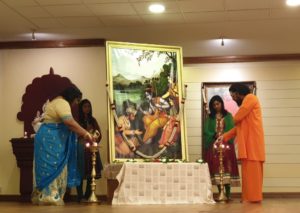 In Valmiki Ramayana one can see how Bhagavan Ram is the personification of dharma and in which way He followed His dharma at all times.
In Valmiki Ramayana one can see how Bhagavan Ram is the personification of dharma and in which way He followed His dharma at all times.
- The core of dharma is that – we respond and live a life which is devoid of ego, attachment, hatred and selfishness. Dharma is a methodology, it is a procedure through which such kind of lifestyle could be adopted.
- Dharma alone is the holding power of a person’s confidence. The strong conviction that I cannot be overpowered by my lower emotions, or by the external success and failures and I can still give out my best, this kind of conviction is called self-confidence and it comes only when one follows dharma. If one does something wrong repeatedly then he is sure to lose his confidence.
- Dharma is such an important aspect that it governs everything in our life, our relations, our joy, security, family, present, future; it has so much of ramifications that it is difficult to understand also. If dharma isn’t there in a person, he will be subject to a lot of vulnerabilities.
Devotion of Dashrathji for Bhagavan Ram
- It is written in Ramayan that when Kaikayi asked two boons from Dashrathiji, firstly that Ram should go to the forest and live like a rishi, and secondly that Bharat should become the king of Ayodhya, then after listening to Kaikayi, Dashrathji fell on the ground and almost fainted.
- Dashrathji told Kaikayi that he can leave everybody in the world but he cannot leave Ram, and that, if he didn’t see Ram every day, he will lose his praan (life). Such an intense bhakti Dashrathiji had for Bhagavan Ram!
- Devotion towards anything means that you cannot live without it. Tulsidasji says in Ramcharitmanas that when Dashrathji, in his last birth, asked for a boon from Lord Vishnu, he said, ‘May I have such a devotion, that just like a fish dies out of water, and a serpent dies when it’s head jewel is taken out, similarly I should die without Ram.’ Such was Dashrathji’s devotion!
Bhagavan Ram’s Impeccable Responses
- Response to Dashrathji’s condition
- When Bhagavan Ram saw his father lying on the ground and his mother Kaikayi very upset, first He offered His namaskaar. Then, without losing His composure & balance, He said, ‘I hope I have not done anything wrong because of which my father is in this condition.’ A person who is humble, he starts thinking of his own faults first before others.
- Bhagavan Ram then said a very beautiful line, ‘O Mother! If my father is angry with me, I would not like to live even for a second. I would rather die but see my father like that.’ Such was Ramji’s love! When you love somebody too much, or you are too devoted, or you are too much surrendered at a place, there you do not want that your Altar should be upset on you on any account, be it logical or illogical.
- Bhagavan Ram continued telling his mother, ‘I owe my existence to my father. He is my living God. And if living God is unhappy with me because of any account, I think I have no right to live. You please tell me mother what I can do so that he can be back to normal.’ Such are the higher ideals set by Bhagavan Ram.
- A person is known by where he is sensitive. Everybody is sensitive somewhere. Some people are sensitive to their father, mother, teacher, and others are sensitive to money, name, fame, relatives, and sensual pleasures. Where you are sensitive, there you owe your existence, and there you are ready to sacrifice. Here we can see how Bhagavan Ram was extremely sensitive to his father.
- Bhagavan Ram also added, ‘For the sake of my father, I am ready to jump in the fire. For my father who is my Guru also, who is the King also, I can drink poison also, I can plunge into the ocean too. There is nothing which I cannot do to please him.’ To please anybody, one has to be a very selfless because he has to give up his ego, attachment and hatred.
- Bhagavan Ram said, ‘O Mother, you just tell me what I should do. One who has done so much for me, who has loved me so much day and night for so many years, if he is unhappy then what is the purpose of my living? Please tell me how he will get out of his remorse and sadness. Whatever he wants, I will do it straight away.’ Such was Bhagavan Ram’s sacrificing nature.
- Response to the news of exile
- When Mother Kaikayi told Bhagavan Ram about the two boons, her words were like death itself but Bhagavan Ram was not perturbed or shaken-up at all. There was no grief on His face because He didn’t feel that He was losing anything. One who himself has a lot of joy, who has no attachment for anything, he remains ever quiet no matter what is take away from him.
- If one is attached to something then the loss of that object or person gives shock. Every shock tells that we were too attached somewhere, that we were mentally engaged with something.
- Bhagavan Ram smiled and said with the same calm face, ‘I will go to the forest Mother, I will go. I can give up Sita and the Kingdom. Whatever is agreeable to my adorable father, it should be accomplished even if I have to give my life.’ A person is known by what he can give up without being upset or sad.
- The essence of dharma is tyaag (sacrifice). The moment you start doing dharma, you will have to renounce. Every role in life, be it the role of a father, or a mother, or a wife, or a disciple, or a teacher, it requires a lot of sacrifice. You cannot play any role correctly unless you are ready to renounce everything for it.
- Bhagavan Ram was ready to do so much of sacrifice. There is no bigger dharma in life than serving somebody. Serving means giving-up our own joy and individuality. Unless this capacity to give up is there, a person’s inner potential divinity doesn’t come out.
- Even after knowing that for the next fourteen years, He will have to live in the forest, put on the bark of a tree, sleep on the floor, eat roots and bulbs, Bhagavan Ram’s face was blooming and shinning. This is possible only when one is established in dharma, devotion and knowledge.
- When Ishwar bhakti is less, Guru bhakti is less, Atma nishtha is less, then we get very easily flustered and sad. One should make himself such that if in a moment it is required for him to leave everything, he can easily leave and walk away.
Bhagavan Ram’s strength was the strength of dharma!
Day 5
Swami Abhedanandaji concluded the monthly Gyan Yagna with wonderful elucidation on Dharma and also on the deep characters of Mother Kaushalya, Lakshmanji and Sitaji which are indeed to be contemplated upon. We are pleased to share with you Swamiji’s concluding advice from the final day’s satsang:
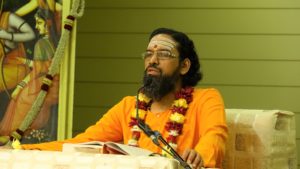 Understanding the core of Dharma
Understanding the core of Dharma
- The avatar of Bhagavan Ram was meant to establish the greatness of righteousness and dharma. Unless Bhagavan Ram has gone through our mind, and heart and actions, the required nobility and inner beauty won’t come in our life.
- Dharma is to follow somebody elder in your life whose injunctions are as per the scriptures, he can be father, mother, or teacher. Those who obey somebody higher, they don’t go on the wrong path.
- Bhagavan Ram happily followed the words of his father without any grudge or irritation. If He had ego, or attachment or hatred, or jealousy, He would not have been able to follow dharma:
- If Bhagavan Ram had ego, He would have felt very small because what was asked of Him, was almost like making a beggar out of a king and that too without any cause.
- If Bhagavan Ram had attachment for the kingdom or his wife, He wouldn’t have been able to follow the words of his father and mother.
- If He had hatred for Kaikayi, He could have thought of taking revenge.
- If He had jealousy with Bharatji, He wouldn’t have gone to the forest at all.
- If Bhagavan Ram was fond of comfort, He wouldn’t have left the kingdom.
- One should try to develop this kind of personality where our ego, attachment, hatred, jealousy and laziness don’t subdue the capacity of doing right in us. If somebody can develop this dharmic personality, then he will feel he is invincible and he cannot be conquered.
- Another important aspect required to follow dharma is, a very developed emotional personality. We all have emotions, but we may not be developed in our emotions. When Bhagavan Ram said that He can’t see His father sad, and He would rather die than seeing his father’s sadness, that shows there was too much of love in Him for his father and mother. Love means – going to any extent for your beloved’s joy.
- It is not possible for an egoistic person to love because the moment his joy, his ego and his bigness is challenged, he will leave his love. Loving is not everybody’s cup of tea because it requires tremendous sacrifice.
- Dharma is difficult because you have no life of your own. Giving up your right for some higher purpose, giving-up your joy for some higher purpose that is the essence of dharma.
Meeting with Mother Kaushalya
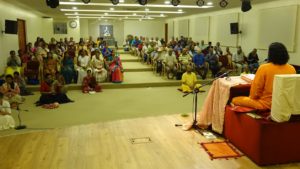 When Bhagavan Ram went to Mother Kaushalya and declared the news, she got very unhappy and sad. She detested that Ramji shouldn’t go to the forest. But Bhagavan Ram said to her, ‘O Mother! I don’t have the power to overcome the words of my father. Please give me your consent. This whole world is dependent on dharma only. Please allow me to go to the forest and follow my dharma.’
When Bhagavan Ram went to Mother Kaushalya and declared the news, she got very unhappy and sad. She detested that Ramji shouldn’t go to the forest. But Bhagavan Ram said to her, ‘O Mother! I don’t have the power to overcome the words of my father. Please give me your consent. This whole world is dependent on dharma only. Please allow me to go to the forest and follow my dharma.’- A house is worth living only when everybody follows their dharma and does what they are expected to do. If everyone does as per their selfish wish, then the house becomes a political center and breaks after sometime.
- If you follow dharma, it creates credibility, confidence and faith towards you in other person’s mind. If the younger person has done his dharma, then the elder person is assured that he will serve when required. And if the elder person does his dharma, then the younger person will think of him as an example to follow, as a guiding factor.
- The binding factor between two people exists not because they eat and drink together, but because they both perform their dharma and following thus they are able bring out something which could serve the society.
- After having heard Bhagavan Ram’s words, Kaushalyaji held herself and said, ‘If you are firm on following the dharma, then the dharma that you are protecting, let that dharma protect you!’ Then she poured a lot of blessings upon Ramji and gave her consent for Him to go.
Reaction of Lakshmanji
- Lakshmanji was witnessing the play of events and he got extremely furious and angry. Bhagavan Ram told him to curb his anger and said, ‘O Lakshman, there is something called fate (providence) and the cause of all this is fate only. Kaikayi was so good with me all through but something entered her mind and she became like this.’
- Bhagavan Ram explained to Lakshmanji that because of fate something completely unexpected can happen anytime. And from unknown sources something can come which cannot be stopped, so Lakshmanji should not be furious, angry and upset over all this.
- When you accept something which is un-conducive as your fate, then that thing doesn’t give you sorrow. One cannot avoid the providence; whatever is there, he has to go through it.
- When we accept our fate, we save a lot of energy to work on that area where we can do something.
- It is said that Lakshmanji was shivering with anger at that time; he was happy because Bhagavan Ram was happy but anger was also there that why Bhagavan Ram was not reacting. Lakshmanji was very upset with both Kaikayi and Dashrathji. He said, ‘O brother! How can they throw you out of the kingdom? Nobody can sit on that throne which is meant for you. I will cut everybody’s head who comes in between you and your throne. I will not allow that you should go in the forest and live like a hermit.’
- Lakshmanji is like a staff and Bhagavan Ram is like a flag, so Lakshmanji tries to always lift Bhagavan Ram and if somebody tries to pull down Bhagavan’s glory then Lakshmanji is very unhappy. But the best quality of Lakshmanji is that no matter how much he was angry, he never did anything which was opposed to the wish of Bhagavan Ram.
Devotion of Lakshmanji
- It is said that Lakshmanji clasped the feet of his brother and said, ‘Please take me with you! I have nobody else other than you.’ Not even for once, Lakshmanji had the thought of attachment toward his wife or the comforts of the kingdom. Such was the ananyata (single pointed devotion) of Lakshmanji.
- In Ramcharitmanas it is written that Lakshmanji said, ‘O brother Ram! I don’t know father, mother or teacher. Only you are there in my life and I want only you.’ This is called para-bhakti.
- Lakshmanji was standing with his palms folded and pleading, ‘I will go with you, please don’t say no. I will never disturb you. I will construct a nice hut for you, so that you can comfortably sleep. I will search and pluck very good fruits for you. In the night, I will be standing with my bow so that nobody can touch you. I will just serve, I will press your feet.’ Those who want to serve, they will find thousand ways to serve. Finally Bhagavan Ram agreed to take Lakshmanji along.
- To serve the Lord, you have to go through a lot of pains. Serving involves – giving up your comfort, your emotional joys and your ego.
Devotion of Sitaji
- When Sitaji came to know about Ramji’s exile, she wanted to go with Ramji. Sitaji said to Ramji, ‘O Lord! I am like your shadow; whatever is your fortune is my fortune. I cannot live without you! When you will walk in the forest, I will walk in front of you and clear the thorns etc., I will put soft mud for you to walk on. Other than you I have nobody in my life. I just love you madly and passionately. I don’t want anything else… I only want you!’
- Then Bhagavan Ram explained to Sitaji that the life in a forest is very difficult and there are fierce animals all around and there is no proper food nor any comforts. Ramji said, ‘O Sita, you are not fit to be there, you are born as a princess, you should live like a princess.’ As much as Ramji was explaining, so much tears were trickling down her eyes. Sitaji told that she is not afraid of anything because when she is with Ramji, even Indra cannot touch her.
- You cannot love anybody unless you are ready to go through a lot of discomfort. The people who love comfort, they cannot live with any Mahatma. When you live with a renunciate person, you have to have a lot of renunciation.
- Sitaji said to Bhagavan Ram, ‘With you, I can live anywhere.’ So much devotion Sitaji must have had! She saw joy in Bhagavan Ram alone and no one else. This is called Ananyata in devotion! Ananyata means the feeling that other than the beloved, nobody else can give you joy, neither do you want joy from anybody.
- Sitaji cried and said, ‘How can you leave me? If you leave me, my praan will go with you.’ We don’t want God because we can live without the remembrance of God. Therefore God doesn’t appear in front of us. God knows that we are happy without him too.
Sitaji didn’t change her mind and eventually Bhagavan Ram agreed to take her with Him to the forest.
Leaving from Ayodhya
- Before leaving from Ayodhya, Bhagavan Ram distributed all his wealth among the Brahmins. So magnanimous He was. All the people of Ayodhya started crying and weeping as they saw Bhagavan leave. They remembered the qualities of Bhagavan Ram:
- He was extremely harmless by nature.
- He was very compassionate.
- He was well versed and learned also but not blunt.
- In Bhagavan Ram, amiability of character was there as if He was sprinkler of joy and coolness everywhere.
- He had self-control and a quiet mind and He was ever smiling
- When Bhagavan Ram was given the attire of a rishi by Kaikayi, He had put it on with the same ease as He took out His royal attire. He had the same luster and smile and beauty on His face as always. So much internal joy one should have, so much piousness one should have!
- Life is about how many sorrows you can gulp without distributing it to others.



